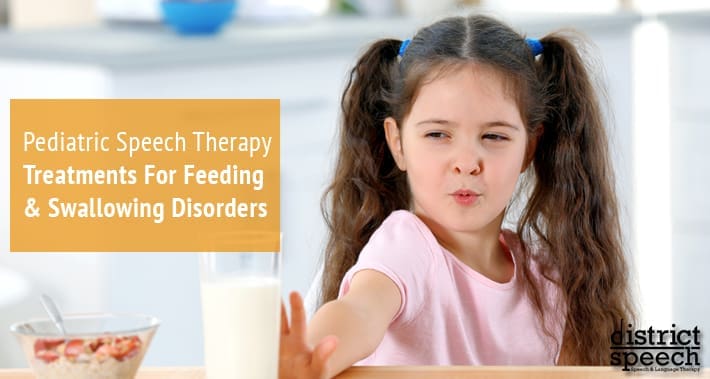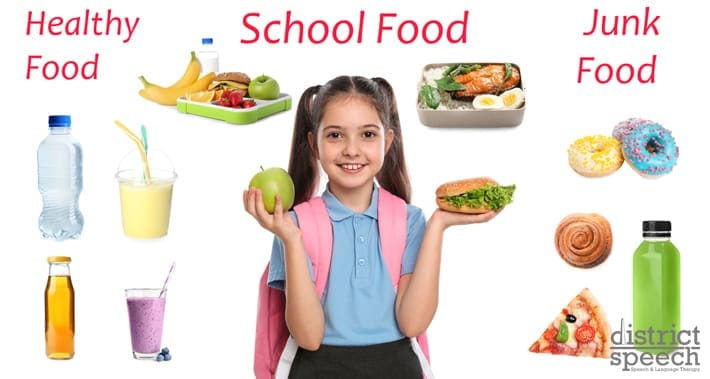
As an adult, you probably don’t think much about eating, unless you’re facing a new situation.
If you’re used to eating with a fork and knife, you may need to learn to use chopsticks the first time you try sushi.
If you’re trying lobster for the first time, you may need to take an extra minute or two to figure out how to pull it apart to get to the good stuff.
But generally you don’t need to think much about it.
Though when children first start to eat solid foods, it’s a different story
Infants may instinctively perform the sucking action needed for feeding, however it doesn’t automatically mean they are getting sufficient nutrition.
As they get older, children learn how to eat solid foods and how to go from drinking from a bottle to drinking from a cup.
When children experience issues with eating, it may be due to a feeding and swallowing disorder.
This is something which can be helped through pediatric speech & language therapy.
You should familiarize yourself with your child’s developmental milestonesin order to know the red flags that indicate you should take your child to a speech language pathologist.
Keep reading to learn more about these disorders and how to recognize them.
What Are Feeding & Swallowing Disorders?
Difficulty swallowing, or pediatric dysphagia, can be due to issues with one or more of the stages of swallowing.
These stages are:
- The oral phase
- The pharyngeal phase
- The esophageal phase
The oral phase includes chewing, sucking, and otherwise moving food from the mouth to the throat.
The oral phase includes feeding.
The pharyngeal phase is the act of swallowing to move food down the throat.
It involves closing off the trachea, or windpipe, to keep food and liquids from entering the lungs.
This is done to avoid choking.
Finally, the oesophageal phase contracts and relaxes to help push food into the stomach.
Issues with this phase can lead to food getting stuck, and to vomiting.
Both the pharyngeal phase and the esophageal phase typically happen unconsciously as an automatic body process.
What Causes Feeding & Swallowing Disorders?
There are a variety of reasons for which feeding and swallowing disorders can occur in children.
Some of the potential causes include:
- Sensory issues
- Stomach problems such as reflux
- Behavior issues
- Issues related to the nervous system such as meningitis or cerebral palsy
- Heart disease
- Cleft lip or cleft palate
- Medicines which affect appetite
- Medications which cause sleepiness
- Autism spectrum disorder
- Low birth weight or being born premature
- Asthma or other breathing issues
- Head and neck issues (ex: torticollis)
- Muscle weakness in the face which could affect ability to chew and swallow like Bell’s palsy
Contrast these with adult dysphagia, which is usually caused by an illness or traumatic brain injury.
How To Tell If Your Child Has A Feeding Or Swallowing Disorder
As a parent or primary caregiver, there are a number of signs to watch for which could indicate a feeding or swallowing disorder.
Some things to watch out for include:
- Not growing at a rate appropriate to their age, or not gaining weight
- Arching of the back or stiffening when feeding
- Crying or fussiness when feeding
- Refusing to eat or drink
- Difficulty chewing
- Getting stuffed up during mealtime
- Becoming gurgly or hoarse during or after meals
- If old enough to be speaking, a breathy voice during or after meals
- Difficulty with breast feeding
- Coughing or gagging during meals
- Drooling
- Liquid coming out of the mouth and nose
- Spitting up
- Falling asleep at mealtime
- Trouble breathing during meals
- Showing preference to eating certain textures for instance only preferring soft or crunchy foods
- Taking longer than normal to eat
Current studies are working on a pediatric screening program for earlier detection because there is a dysphagia prevalence of 85% in children with neurodevelopment disorders.
RELATED : How Can Speech Therapy Help With Autism Spectrum Disorder?
RELATED : How Can Speech Therapy Help With Down syndrome?
Issues Associated with Feeding and Swallowing Disorders
If your child or infant is showing signs of a feeding or swallowing disorder, it’s important it be addressed quickly.
Left untreated, these disorders can put your child at risk of:
- Embarrassment related to eating issues, especially once they are school aged
- Dehydration
- Issues related to poor nutrition
- Lung infections such as pneumonia
- Aspiration – food or liquid in the airway

How Can A Speech Therapist Help With Feeding & Swallowing Disorders?
A speech therapist can help if you suspect your child has a feeding and swallowing disorder.
Studies indicate that speech therapy is a fast and effective way to improve your child’s dysphagia.
To start, they will first perform tests to determine if this is actually the issue.
Once a feeding and swallowing disorder has been identified, some of the suggestions to address the issues may include:
- Changing the position of your child when eating
- Feeding therapy
- Having them try different types of foods
- Working on behavior issues, such as avoidance of certain textures of food
- Changing the texture or temperature of food
- Medicines to treat conditions such as reflux
- Referrals to other professionals such as a dentist or psychologist
If your child requires treatments specifically targeted to feeding or swallowing, a speech language pathologist may work with them on:
- Assisting with sensory issues
- Strengthening the muscles of the mouth
- Tongue movement
- Helping them chew foods
- Assisting them in learning how to breath while chewing food
- Modifying food textures to improve swallowing safety
- Dealing with behavior issues during mealtime
Book Your Appointment With District Speech Today
If your child is exhibiting signs of a feeding and swallowing disorder, getting them help right away is important.
If left for too long, it could impact their nutrition and growth.
Remember, the best age to begin speech therapy is as soon as you notice your child is having challenges.
Here at District Speech, we can help.
Book your appointment with District Speech today.
1300 I St NW, Suite 400 E,
Washington, DC 20005
- https://g.page/districtspeech
District Speech and Language Therapy specializes in speech therapy, physical therapy, and occupational therapy solutions, for both children and adults, in the Washington D.C and the Arlington Virginia areas.